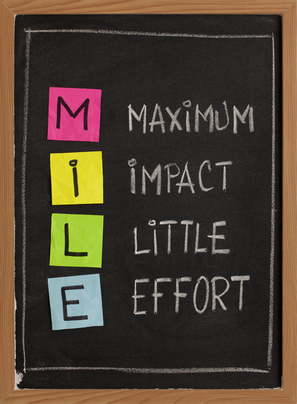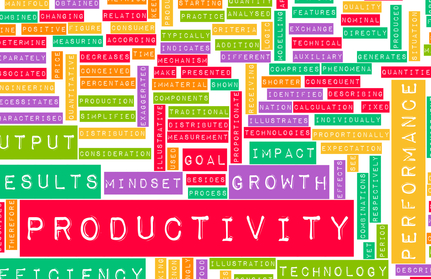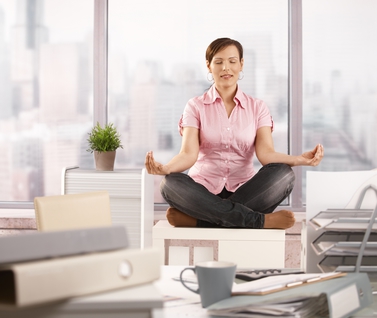Studies show time and time again that distractions are costly (the email "ding" alone costs $70 billion a year in lost revenues) (source).
Even if you're not a business owner, this is still a scary thought as an employee. Not getting enough done can mean late nights at work, taking work home, working on the weekend or worse ---- missing out on that raise or promotion. (Or still even worse, the company laying people off because profits are down).
The solution isn't to work more. It's actually to work less (so minimalist) but being much smarter about our work.
And I don't just mean working smarter (yes that is important). I mean making a smart environment for ourselves.

In order to maximize productivity we have to minimize distractions.
(*Although this post is largely about work/career/business, I think the same thing can be said about life, too. I get distracted at home and it interferes with domestic productivity. I'll walk away from laundry or cooking because something caught my eye on TV. Or while I'm trying to organize my closet, I inevitably find something that sends me down the black hole of memory lane. (This happens annually when putting away holiday decorations!)).
The two big culprits to (un)productivity are interruptions and multitasking.
I know it seems to go against logic that multitasking hampers productivity but it really does. If you want to be super productive, switch to single tasks.(*Check out that MM post if you haven't already. It'll really change your your work flow and in all the right ways!)
Quick history: I become obsessed with productivity when I started freelancing a few years back. Part of my drive was that as a "freelancer," and not an "employee," I was now only being paid for what I actually produced. Just showing up and sitting at my desk for eight hours to "work" didn't guarantee my paycheck.
Although I couldn't wait to escape the office, work from home in my PJ's, and set my own schedule (hello exit strategy school!!), the transition wasn't exactly smooth. I had a pretty big adjustment period. I quickly became aware how un-productive I was.
I mean, it's not like I was sitting in my yoga pants watching back-to-back episodes of my favorite reality Tv show. I WAS working. and I was EXHAUSTED (aka "brain dead") and the end of each day. Yet my output was dismal. It certainly wasn't where I needed it to be to survive financially.
Needless to say, I've been a work-in-progress ever since and here are some of my experiences and discoveries.

As a small business owner, productivity is everything, especially now that I decided to stay small and keep Happy Herbivore a mostly one-woman-show.
I have to be productive. And to be productive, I have to be free of interruptions.
Interruptions come in many forms and they're often disguised.
For example, email is a huge distraction and interruption. I've learned that the worst thing I can do is to leave my email open.
If I leave my email open I will never get out of it and my entire day will fly by before I have a clue what's happened.
"Where did the day go? Geez! I got nothing done!"
YEAH because I never got out of my email.
Schedule block periods where you check your email and schedule these at "low productivity" times. For example, my most productive hours are in the early morning so I don't go anywhere near my email in the morning (except for a quick glance to make sure there are no emergencies -- like a website report saying the whole thing crashed).
Around the afternoon, and late into the evening, my brain starts giving up on me and my productivity plunges (even in an optional working situation). Those are the times I email :)
Keep your email closed all other times.
I admit, at first, this gave me a lot of anxiety. Especially when I would open my email and see I had 50-100 (sometimes 200!) unread messages that accumulated throughout the day. HOWEVER, the data doesn't lie. (I'm pretty militant about tracking my productivity).
The amount of work I accomplished when I batch emailed was nearly quadruple (quadruple!) to days when I didn't get out of my inbox. In some ways it's almost not comparable. I was light years more productive.
For example, if I set aside an hour to do my email at the end of the day, I could get through all of it (most of the time) in an hour or so. Say I had 40 emails, I'd get through all of them back-to-back in 60 minutes or less. BUT if I checked my email several times a day (not just left it open, but checked every other hour or so--mini batches), it would take me 2-3 hours total... for the same amount of email! and that's on top of the fact my overall "total" productivity for the day went down, too.
It was so hard to face that data. How is that possible? But that's the problem with multitasking -- all the delayed and lost time from switching between tasks.
(You gotta stay minimalist!)
My experience with email reminds me of a scene in the movie The Pursuit of Happyness, where Will Smith's character realizes he can save several minutes a day by not hanging up the phone between calls. (This allowed him to call even more potential clients, giving him a huge leg up on his competition. Chris also had to be super productive because he had to accomplish in 6 hours what everyone else accomplished in 9). It's very inspiring! (The whole movie is!)
It's the little wastes of time that matter most with productivity.
Next, I went crazy with my email filters.
For example, "Vacation replies" are deleted automatically. I never even see them. (If you send out any kind of newsletter, do yourself the HUGE favor of setting up this kind of filter!).
Speaking of newsletters, there are a few I read pretty religiously, but never at the time they are sent. I usually read them when I'm waiting -- such as in line at the grocery store. Still, having them stare at me fresh faced in my inbox was no bueno, so they skip past my inbox and go to a "read me" folder.
I also get a lot of automated updates (like new comments posted to this blog) and they too immediately go into a folder out of my inbox so I can batch check them later. They don't distract me one-by-one as they bubble up.
It's also important to set expectations with others -- and yourself -- about response time.
This was hard for me, as I prided myself on being immediately available for my fans and my customers. Most often people received an immediate response for me -- within minutes.
However, being "available" like this meant I couldn't help as many people each day. I ultimately decided it was better for me (and my fans and customers) to help more people, than to help fewer more quickly.
I asked myself: What is an appropriate response time? 1 hour? 1 day?
I decided 24 hours was fair, and it's rare that anyone ever waits that long.
Think about this and set a rule with yourself so you never feel pressured to stay in your inbox, sitting on it like you're a chicken trying to hatch and egg.
I also find it's really helpful to say when you want/need/would like an answer by when dealing with others.
A new level of peace and zen came over HH Inc. when we all agreed to start putting clear timelines, deadlines, and expectations for responses in our emails to each other.

To wrap up: Get your email in check and stay out of it if you want to be productive :)
Related Minimalist Email Posts:
Minimalist Monday: Email Management (How to Organize Email, Increase Productivity & Reduce Stress)
Minimalist Monday: Click Unsubscribe More Often
"It's everything I wanted and nothing I delete. I love my minimalist inbox"
Notifications
Turn them off.
Disable notifications from Twitter, Instagram and your personal email (at least while you're at work). I've even disabled my work email. No bings!
When I'm working, I also turn my phone into "do not disturb." It's okay to let phone calls go to voicemail. Particularly during the middle of the workday. Do batch callbacks at night.
If something is really emergent, you'll get the call at your desk.
You can also set it up so certain calls or texts (like from your boss) still ring, while others do not.
My sister and best friend both have jobs where they are not allowed to have a phone. They can't even bring it into the building where they work. They also don't have access to their email and I can't email their "work email" either.
At first I was annoyed and found this crazy stressful. What do you mean I can't call you or text you or email you for 9-10 hours out of the day? What if there is an emergency??
In 2+ years, do you want to guess how many times I called or texted? None.
How many emergencies there were? 1.
And I called the main line and was put through immediately.
Sometimes we forget it wasn't that long ago that we were often not available.
When I was a kid, I can remember my parents leaving the restaurant's phone number with a babysitter because there was no other way to get ahold of my parents.
When we left the house, no one could call us. All they could do was leave an answer on the machine. We'd hear that message several hours, sometimes several days, later. The world was not instant and yet, we were okay :)

Human Interruptions
Coexisting is a challenge to productivity. Even non-humans present certain challenges. For example, I sometimes find it hard to work at home because the pugs can be loud or fussy or they'll suddenly scream for attention. (Yes, scream!)
I love them but mama needs to work sometimes!
When I was still working in an office as a lawyer, I frequently shut my office door. It's not the most warm behavior but it does say "hey, I'm serious, please don't drop in."
I also developed a number of explanations ;) "OH I closed it for a call and then was too lazy to get back up to open it" "I was really cold, thought shutting the door would help" "needed to concentrate" "really behind, trying to get ahead" "I'm not feeling well, didn't want to spread germs" and so on :P
Before I had my own office I wore headphones. I wasn't actually listening to music ;) but it kept my coworkers from interrupting me.
At HH Inc we have (had?) a designated "quiet hours" policy. The policy is simple: You can't interrupt another person by phone, email, or drop in, unless it's an emergency or very time sensitive. I don't enact this all day, but we do have designated periods and no question, everyone's productivity is (was?) at an all time high during these periods.

Take Breaks
Yes you heard me, work less.
Scott uses the Pomodoro Technique where you work for 30 minutes and then you take a 5-minute break. After a few rounds of this, you take a more substantial break (i.e. 30 minutes).
Scott swears by this saying the break and "fresh eyes" often helps him find bugs or solutions he had been missing.
Although I don't use the Pomodoro Technique exactly, I find I have a natural ebb and flow that is very consistent with the technique's concept. It really does make a difference!
The 5-Minute Rule: If the task takes less than 5 minutes to do it, do it immediately. Even if something else wasn't finished. As long as that bigger project isn't a huge emergency, do the fast task because it's the little "fast" tasks that get you behind. It's never the big projects. It's all the little things that get shoved on a back burner.
On that note, if something is going to take more than 5 minutes, immediately add that task to a "to do" list. Emails that take more than 5 minutes to read/respond to go on the list!
Don't Sit on Unfinished Work.
Instead of waiting for a blog post to be 100% done before I put it into the blog admin, I put it in as soon as I have anything to offer (beyond just the idea). Whether it's 40%, 65% or 90%. Seeing it there, even unfinished, gives me a real sense of accomplishment and progress.
I imagine this can't apply to all types of projects, but for those where it works, it will help motivate you!
Don't switch back and forth between tasks.
Like I said, single-task! :)
Another (third) distraction that eats up productivity is disorganization. Not only do you lose time looking for things, a cluttered, chaotic, and disorganized work space does not create an environment for maximum productivity.
Spend some time getting organized and creating a system so you stay organized. It is a wise investment of your time.
(*Image Source for desk)













